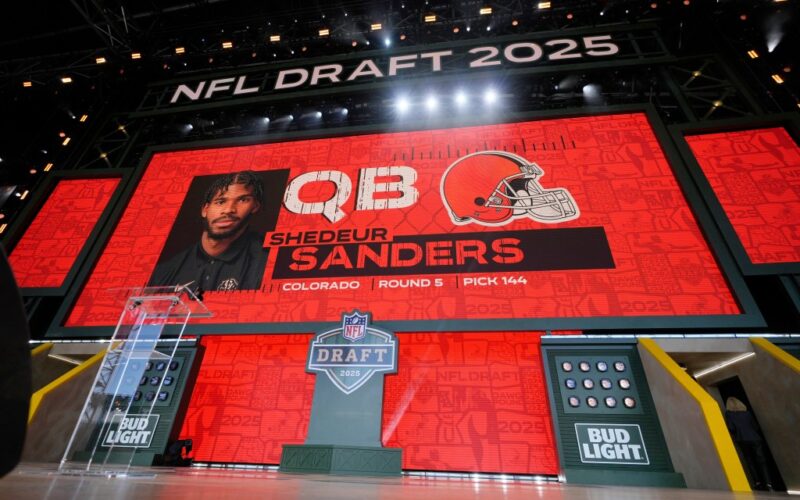NFL Commissioner Roger Goodell should open an investigation into the rampant racism exhibited by teams regarding the recent college draft. Shedeur Sanders, the most effective quarterback in college last year, was overlooked by all 32 teams. Not once. Not twice. Not three times or four.
It wasn’t until the fifth round that the son of Hall of Famer Deion Sanders was chosen by the Cleveland Browns. Meanwhile, five other quarterbacks and 143 other players were chosen before Shedeur. Even the Browns chose another quarterback before him.
Although his achievements spoke for themselves (74% completed passes; 37 touchdowns), Sanders was the subject of a smear campaign by NFL coaches and general managers who described him as “ultra-confident.” According to the Daily News, team officials “spoke anonymously” and called Sanders “entitled.” He was labeled “unprofessional,” “disinterested,” “brash,” “arrogant,” and “entitled.”
Going back to the early years of the NFL, these adjectives have been used to describe and demean Black players. In fact, it took decades until the league began to sign Black players. It was decades after that before Blacks were allowed to play quarterback.
They had been maligned as mentally inferior, incapable of understanding the complexities of NFL offenses. Often, even if they excelled as college quarterbacks, Black players who were drafted and signed would be placed in a different position in the pros because of those stereotypes.
In a post on Truth Social during the draft, President Trump asked: “What is wrong with NFL owners, are they STUPID? Shedeur is all set for Greatness. He should be “picked” IMMEDIATELY by a team that wants to WIN.”
Part of what’s wrong with the NFL owners is that all 32 are billionaires suffering from a lifetime disease of over-privilege. They are used to getting taxpayer subsidies for their stadiums, docile elected officials who provide them with free municipal service (cops, firefighters, EMS) and a compliant media that fawns over them in exchange for tickets, access and perks.
That’s why in a league where two-thirds of the players are Black, these owners have hired only four Black head coaches.
That’s why the league is defending itself against a lawsuit by former head coach Brian Flores which characterizes the hiring process of the NFL conducted by the owners as, “discrimination.”
That’s why the Jets, who have a long history of making enormous mistakes in selecting quarterbacks (Aaron Rodgers, Brett Favre, Richard Todd, Zach Wilson, Browning Nagle, et al) passed on Sanders.
That’s why the Giants undercut his talent by claiming that he was “unprepared” to lead their team. With the third pick in the draft, desperate for a quarterback, they chose someone whose statistics were inferior to Sanders. (In a postscript to the actual draft, it turns out that it was the NFL that was “unprepared.” It failed to secure the private phone numbers of its draftees, leading to prank calls to Sanders and emotional abuse to other players).
Remember how the Giants treated their star, All-Pro running back, Saquon Barkley, last year? They refused to pay him what he is worth. Barkley left the Giants and signed with the Eagles, where he ran rings around his opponents and led his team to a Super Bowl victory.
Barkley and Sanders were both treated disrespectfully, bad-mouthed, and demeaned by the Giants. The same was not true for Eli Manning when he was drafted, and he refused to play for the Chargers. No one called him “entitled” because his father was a great pro in the NFL. No one questioned his leadership skills, even though he disregarded the league rules and protocols by refusing to play for San Diego. No one labeled Eli “brash” or “arrogant.” The Giants welcomed Manning and his Dad, Archie, with open arms.
Before the draft, Shedeur was considered one of the top three quarterbacks available. He had turned around a moribund Colorado program because his teammates trusted his leadership, he appreciated their talents and Shedeur believed in himself. These are the intangible qualities that make for great quarterbacks like Warren Moon, Johnny Unitas, Joe Montana, Patrick Mahomes, and Tom Brady.
Some quarterbacks have stronger arms, some have quicker releases, some can run, and some can improvise amidst the dangers of a defense that sees the quarterback as its prey. But the most important quality of being a great quarterback is believing in your team and yourself.
The stereotyping cost Sanders millions of dollars, but it also cost the NFL its self-touted image of being a racism-free employer.
Goodman is a sociologist and author of “Inventing Social Change.”








